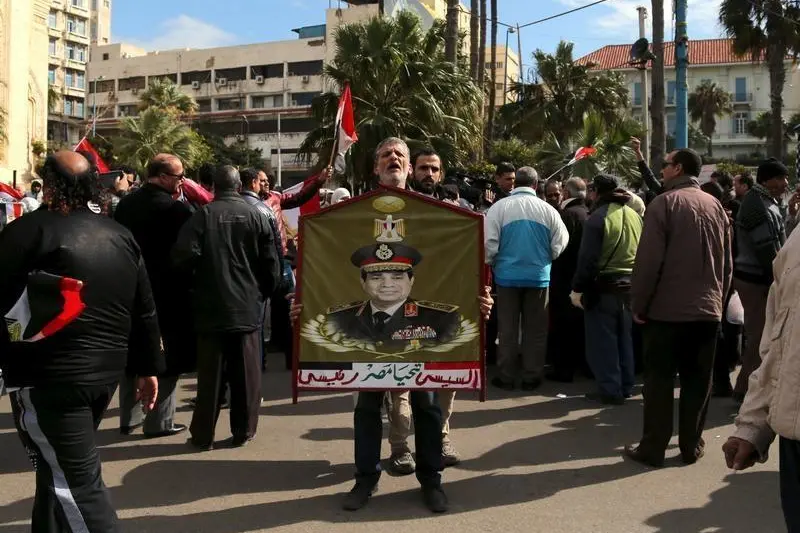PHOTO
* Streets empty amid widespread crackdown
* Only supporters of Sisi, police in Tahrir Square
* Activists lament roll back of uprising freedoms
(Adds quote from April 6, arrests)
By Ahmed Aboulenein
CAIRO, Jan 25 (Reuters) - About 300 people gathered in Cairo's Tahrir Square on Monday, not to celebrate the instigators of the revolt that five years ago overthrew Egypt's longtime ruler Hosni Mubarak but to praise the police who tried to stop them.
"We are here to celebrate with our brothers, fathers, and colleagues in the Egyptian police... who sacrificed their lives and blood for us," said one of the demonstrators, 52-year-old home appliance repairman Refaat Sabry.
He wore a pin on his jacket depicting Abdel Fattah al-Sisi, Egypt's latest general-turned-president, whose crackdown on both the youth activists who led the 2011 revolution and the Islamists it later brought to power has dashed their hopes for a new era of political freedom.
"Continue Mr President," read a placard held by one man, flipping the demand for "the fall of the regime" -- the rallying cry of the Arab Spring uprisings that shook entrenched leaders from Tunisia to Yemen in a single fateful year.
Five years on, some of the countries touched by the revolts have slipped into war or chaos and others have seen the return of rulers less willing than ever to tolerate criticism.
"Five years since the start of the great Egyptian revolution... the counter-revolution has been able to take control once again," said a statement from 6 April movement, which was at the forefront of the 2011 uprising.
"The revolution is not over. It continues and its goals remain in the hearts of all the Egyptians who backed it for the sake of a free, strong and advanced nation..."
The first democratic elections held after the revolt saw the Muslim Brotherhood, Egypt's oldest Islamist movement, emerge from the shadows to dominate both parliament and presidency.
Sisi, then Egypt's military chief, removed President Mohamed Mursi from power in 2013 and banned the Brotherhood after a turbulent period in which protests against the group grew.
In the weeks that followed, hundreds of Mursi's supporters were killed in the streets and thousands were locked up in the bloodiest crackdown in Egypt's modern history.
Liberal and leftist activists, some of whom had supported Sisi's move to depose the Brotherhood, soon found themselves on the wrong side of the new authorities, which now flag protests against Mursi that began on June 30 as the real revolution.
New laws were passed, curbing protests and expanding the jurisdiction of military courts. Sisi went on to win a presidential poll with almost 98 percent of the vote.
NO HOPES, NO FEARS
There are no official celebrations to mark the uprising against Mubarak and security forces have launched a campaign to discourage protests and detain people from administrators of Facebook pages to student activists.
Instead, the focus has been on celebrating the police -- before the 2011 revolt, January 25 had long been an official holiday to commemorate their role in protecting Egyptians.
Hundreds of police and soldiers have been killed in attacks by Islamist insurgents since Mursi's removal in 2013, including an Egyptian affiliate of Islamic State operating in the Sinai Peninsula. The Muslim Brotherhood has distanced itself from such attacks and maintains that it is a political movement.
Brotherhood officials in exile and a pro-Mursi group had called on Egyptians to launch a new revolution, but major demonstrations failed to materialise.
In Alexandria, police defused an explosive device and broke up several small gatherings, detaining about 15 people, said the official MENA news agency.
A security source said police killed two militants in an apartment in Sixth October City to the west of the capital. He said the two were accused of killing a policeman weeks earlier.
Six people were also detained in the same area after taking part in what the source described as a Brotherhood protest.
In Matariya, a Muslim Brotherhood stronghold in Cairo, a crowd of young men gathered to celebrate Police Day, hours after police dispersed a Brotherhood protest.
Counter-terrorism officers in black masks and brandishing assault rifles looked on.
In letters and interviews from jail, youth activists charted their journey from the hope and exuberance of the 18-day revolt of 2011 to their new battle against despair.
"I have nothing to say: no hopes, no dreams, no fears, no warnings, no insights, nothing, absolutely nothing," Alaa Abdel Fattah, who is serving a five-year sentence for taking part in a small protest, wrote in the British Guardian newspaper.
Back in Tahrir, the metro station was closed, as were nearby shops. Roads leading to the Interior Ministry were cordoned off with police trucks and barricades.
Revolutionary graffiti daubed on the walls of Mohamed Mahmoud street, the central Cairo site of violent standoffs between police and demonstrators, has been largely erased.
Instead, Sisi supporters waved huge Egyptian flags and handed flowers to security forces.
(Additional reporting by Mostafa Hashem; Writing by Lin Noueihed; Editing by Michael Georgy and Philippa Fletcher) ((lin.noueihed@thomsonreuters.com; +202 2 394 8039; Reuters Messaging: lin.noueihed.thomsonreuters.com@reuters.net))
Keywords: EGYPT REVOLT/ANNIVERSARY





















